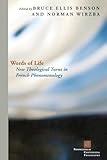Words of Life : New Theological Turns in French Phenomenology / ed. by Bruce Ellis Benson, Norman Wirzba.
Material type: TextSeries: Perspectives in Continental PhilosophyPublisher: New York, NY : Fordham University Press, [2022]Copyright date: ©2010Description: 1 online resource (272 p.)Content type:
TextSeries: Perspectives in Continental PhilosophyPublisher: New York, NY : Fordham University Press, [2022]Copyright date: ©2010Description: 1 online resource (272 p.)Content type: - 9780823230730
- 9780823293605
- online - DeGruyter
| Item type | Current library | Call number | URL | Status | Notes | Barcode | |
|---|---|---|---|---|---|---|---|
 eBook
eBook
|
Biblioteca "Angelicum" Pont. Univ. S.Tommaso d'Aquino Nuvola online | online - DeGruyter (Browse shelf(Opens below)) | Online access | Not for loan (Accesso limitato) | Accesso per gli utenti autorizzati / Access for authorized users | (dgr)9780823293605 |
Frontmatter -- Contents -- Acknowledgments -- Introduction -- PART I Reflections on the Theological Turn -- Continuing to Look for God in France: On the Relationship Between Phenomenology and Theology -- Being Without God -- The Appearing and the Irreducible -- ‘‘it / is true’’ -- PART II Jean-Luc Marion -- The Phenomenality of the Sacrament— Being and Givenness -- The Human in Question: Augustinian Dimensions in Jean-Luc Marion -- The Poor Phenomenon: Marion and the Problem of Givenness -- PART III Michel Henry -- Michel Henry’s Theory of Disclosive Moods -- Can We Hear the Voice of God? Michel Henry and the Words of Christ -- Radical Phenomenology Reveals a Measure of Faith and a Need for a Levinasian Other in Henry’s Life -- The Truth of Life: Michel Henry on Marx -- PART IV Jean-Louis Chrétien -- The Call of Grace Henri de Lubac, Jean-Louis Chrétien, and the Theological Conditions of Christian Radical Phenomenology -- Between Call and Voice: The Antiphonal Thought of Jean-Louis Chrétien -- Chrétien on the Call That Wounds -- Embodied Ears: Being in the World and Hearing the Other -- The Witness of Humility -- Notes -- Contributors -- Index
restricted access online access with authorization star
http://purl.org/coar/access_right/c_16ec
Words of Life is the sequel and companion to Phenomenology and the "Theological Turn," edited by Dominique Janicaud, Jean-Francois Courtine, Jean-Louis Chrétien, Michel Henry, Jean-Luc Marion, and Paul Ricoeur. In that volume, Janicaud accuses Levinas, Henry, Marion, and Chrétien of "veering" from phenomenological neutrality to a theologically inflected phenomenology. By contrast, the contributors to this collection interrogate whether phenomenology's proper starting point is agnostic or atheistic. Many hold the view that phenomenology after the theological turn may very well be true both to itself and to the phenomenological "things themselves." In one way or another, all of these essays contend with the limits and expectations of phenomenology. As such, they are all concerned with what counts as "proper" phenomenology and even the very structure of phenomenology. None of them, however, is limited to such questions. Indeed, the rich tapestry that they weave tells us much about human experience. Themes such as faith, hope, love, grace, the gift, the sacraments, the words of Christ, suffering, joy, life, the call, touch, listening, wounding, and humility are woven throughout the various meditations in this volume. The contributors use striking examples to illuminate the structure and limits of phenomenology and, in turn, phenomenology serves to clarify those very examples. Thus practice clarifies theory and theory clarifies practice, resulting in new theological turns and new life for phenomenology. The volume showcases the work of both senior and junior scholars, including Jean-Luc Marion, Jean-Yves Lacoste, Kevin Hart, Anthony J. Steinbock, Jeffrey Bloechl, Jeffrey L. Kosky, Clayton Crockett, Brian Treanor, and Christina Gschwandtner-as well as the editors themselves.
Mode of access: Internet via World Wide Web.
In English.
Description based on online resource; title from PDF title page (publisher's Web site, viewed 03. Jan 2023)


